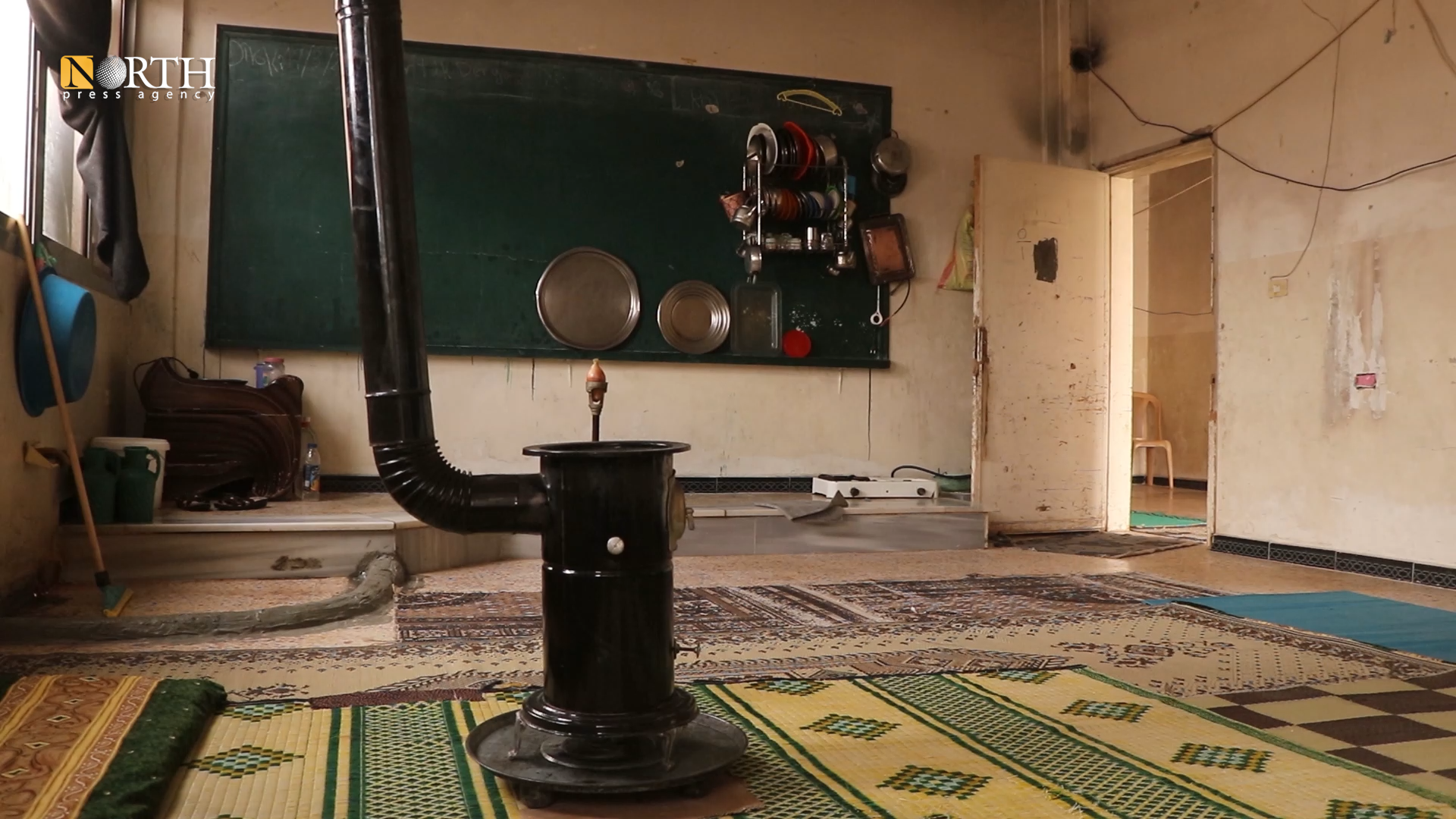TEL TAMR, Syria (North Press) – Zahra al-Eleiwi, an IDP from the countryside of Tel Tamr, north of Hasakah, northeast Syria, is covering outworn mats in a classroom in a school that lacks the least aspects of life.
Al-Eleiwi fled her home that was destroyed as a result of Turkish shelling supported by Turkish-backed armed factions and ended up with her five children and husband in an accommodation center in a school amidst deteriorating livelihood conditions and shortage of relief assistance.
After being stranded, dozens of Syrian families, which fled battles during the Turkish aggression on Sere Kaniye (Ras al-Ain) and Tel Abyad in late 2019, are residing in schools of Tel Tamr that were turned into shelters.
Al-Eleiwi said some good people provided her with mattresses and some household items, while the organizations’ aid is limited to a food basket every two months “which can hardly meet our needs.”
Two years ago, all world relief organizations left Tel Tamr after the town was turned into a frontline with the Turkish forces and the Syrian armed factions affiliated with them, so that support and relief provided to more than 3,000 IDPs there have been halted, according to statistics by Organizations Affairs Office in Tel Tamr.
Lack of relief
The interruption of aid relief exacerbated the deterioration of the livelihood condition of the IDPs in light of the lack of job opportunities and prices hike.
Al-Eleiwi’s husband works as a day laborer, and her older son gets 3,000 Syrian pounds (SYP, less than one US dollar).
Although she suffers from asthma and disc, she has not visited a doctor because “I cannot afford the expenses of the checkup.”
“Our livelihood is really hard, what my husband and son make, does not meet our needs,” she added.
Organizations do not provide IDPs in Tel Tamr with aid under the pretext that the town is a frontline so that they cannot reach to provide the support,” head of Organizations’ Affairs Office of the Autonomous Administration of North and East Syria (AANES), Khalil Khello, said.
Al-Eleiwi used to work in fields and help her husband in house expenses, but after being displaced she becomes workless in light of the decline in the agricultural season.
Winter is cruel for the IDPs in the classrooms in light of the lack of clothes, heaters and blankets.
“Winter has come, but we are not prepared. We have no heating. It is too cold at night,” she noted.
In July 2020, the al-Ya’rubiyah/Tel Kocher crossing was closed to UN humanitarian access to north and east Syria due to the veto of Russia and China, which exacerbated the challenges facing the region, according to civil organizations.
Activists estimate that the closure of the crossing between Syria and Iraq has caused harm to about two million IDPs and low-income residents in the region.
Despite calls by organizations and member states of the UN for re-authorization, the repeated Russian-Chinese veto led to rejection or amendment of the proposal, sometimes even before voting.
The closure of the crossing deprived residents of Syria’s northeast of aid estimated at $26.8 million, due to the cessation of support for many organizations operating in the region, the head of the Organizations’ Affairs Office in the Jazira Region, Khaled Ibrahim, told North Press previously.
Failure to accommodate all IDPs
According to data released by AANES, the Turkish invasion of Sere Kaniye and Tel Abyad, displaced more than 300,000 people, most of them Tel Abyad IDPs who settled in the city of Raqqa and its villages in addition to Tel al-Samen camp, north of Raqqa.
Meanwhile, some of Sere Kaniye’s IDPs resorted to Washokani Camp, west of Hasakah, in 80 schools in Hasakah city and its villages, and in other schools in other different cities.
In September 2020, AANES announced that they would start moving all IDPs who resided in different schools to the newly established Sere Kaniye Camp east of Hasakah, but some families refused to move to the new camp as the camp could not accommodate large numbers.
In the next room, the 41-year-old IDP Khaznah, who is residing in a shelter in Tel Tamr, is preparing food for her family.
She said her family is relying on the wage of both her husband and her daughter-in-law, which has been working as a nurse in a clinic in the town since her husband [son of Khaznah] died.
As for the food basket that they receive each two months, it does not meet their basic needs, as it can hardly last for ten days, according to her.
“Life here is really hard, to the extent that the mattress we are sitting on, was provided to us by good people,” she added.

